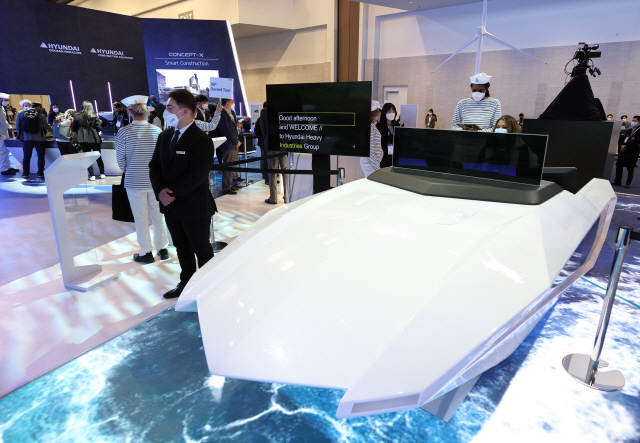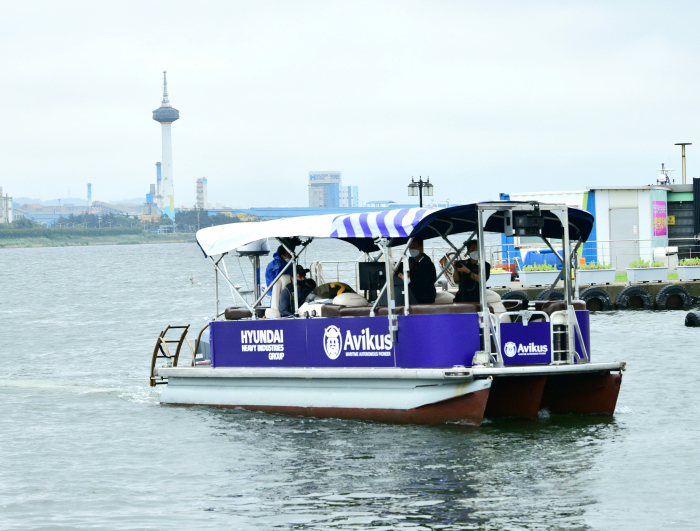Shipping & Shipbuilding
Hyundai's self-sailing ship set for maiden cross-Pacific voyage
The LNG carrier features higher-degree automation technology than existing models
By Apr 28, 2022 (Gmt+09:00)
3
Min read
Most Read
LG Chem to sell water filter business to Glenwood PE for $692 million


KT&G eyes overseas M&A after rejecting activist fund's offer


Mirae Asset to be named Korea Post’s core real estate fund operator


StockX in merger talks with Naver’s online reseller Kream


Meritz backs half of ex-manager’s $210 mn hedge fund



A liquefied natural gas (LNG) carrier with autonomous sailing systems will embark on an ocean voyage next month to become the world's first large autonomous ship to sail the open seas.
The LNG carrier, built by Hyundai Heavy Industries Group, will depart from North America and cross the Pacific Ocean, according to maritime and shipbuilding industry sources on April 27.
The vessel, named Prism Courage, is 300 meters long, 46.4 m wide and 26.5 m high. It is equipped with autonomous navigation and berthing systems developed by Avikus Co., a subsidiary of Hyundai Heavy.
During its voyage, it will operate autonomously for a significant portion of the sailing course without human involvement. Its detailed course is being discussed with a shipping company.
Last year, Hyundai successfully conducted a test run of an autonomous boat for the first time in South Korea as it is aiming to bring self-driving leisure boats to the market this year.
DEGREE TWO
The large LNG carrier Prism Courage has adopted more advanced technology, or Degree Two of ship automation identified by the International Maritime Organization (IMO).
Degree Two means that in addition to the obstacle detection sensors, the vessel is installed with autonomous navigation and control systems but with a crew member on board.
Degree Four is the highest level and refers to a fully autonomous ship.

Up to now, Hyundai has applied Degree One autonomous sailing technology to 140 vessels, including 48 container ships ordered by Canada’s Seaspan Marine Corp.
It is aiming to win orders of another 60 to 70 vessels with autonomous systems by year-end.
Hyundai expects a successful ocean cruise by Prism Courage will create demand for its Degree Two autonomous ships. By 2023, the shipbuilder also plans to build autonomous eco-friendly, electric battery-powered vessels.
"We will commercialize our Degree Two autonomous ship technology by next year," Avikus Chief Executive Lim Do-hyeong said.
Avikus’ autonomous ship technology is composed primarily of navigation and berthing assistant systems, called HiNAS and HiBAS, respectively.
HiNAS is a computer vision and AI-based system that assist safe navigation by displaying detected ships and navigation information in augmented reality images.
HiBAS shows a top-view image recorded by multiple bird-eye cameras installed around the ship for berthing and unberthing safety.

Avikus' Lim said that autonomous navigation systems developed by other countries like Finland, Japan and Norway as national projects remain in their nascent stages: sailing in nearby coastal waters.
"We will dominate the world’s leisure boat market amounting to 10 million boats ... We take leisure boats for fun, not to have to drive," he noted.
Avikus was set up in December 2020 as Hyundai Heavy Industries Group’s first in-house startup and was spun off in January 2021.
The group’s holding company HD Hyundai, formerly known as Hyundai Heavy Industries Co., has injected a total of 14 billion won to make Avikus a wholly-owned unit.
To build networks with global shipping companies, Hyundai has recruited Karl Johansen, a former engineer of Rolls-Royce Marine, which holds the original technology of autonomous ships.
The world’s autonomous vessel market is expected to grow to 297 trillion won ($234 billion) by 2028 from 95 trillion won in 2021, according to research firm Acute Market Reports and the Ministry of Oceans and Fisheries.
Write to Jeong-Min Nam at peux@hankyung.com
Yeonhee Kim edited this article
More to Read
-
 Leadership & ManagementChung Ki-sun joins KSOE boardroom, to take helm at Hyundai Heavy
Leadership & ManagementChung Ki-sun joins KSOE boardroom, to take helm at Hyundai HeavyMar 23, 2022 (Gmt+09:00)
2 Min read -
 Mergers & AcquisitionsHyundai Heavy, DSME merger falls through on EU veto
Mergers & AcquisitionsHyundai Heavy, DSME merger falls through on EU vetoJan 14, 2022 (Gmt+09:00)
5 Min read -
 Shipping & ShipbuildingHyundai Heavy’s heir apparent to unveil future vision at CES 2022
Shipping & ShipbuildingHyundai Heavy’s heir apparent to unveil future vision at CES 2022Dec 30, 2021 (Gmt+09:00)
1 Min read
Comment 0
LOG IN


